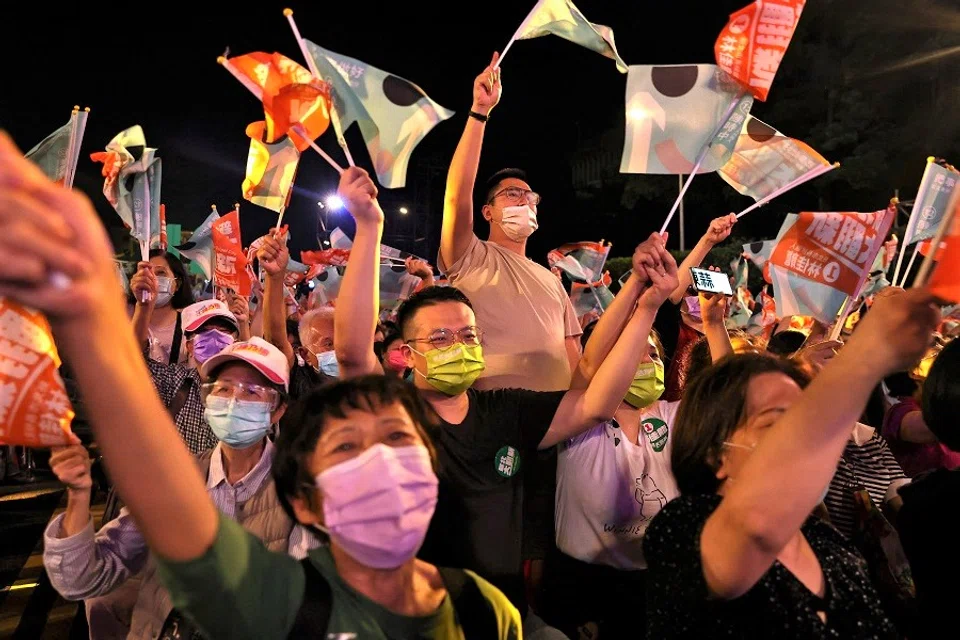Taiwan's mayoral race will impact 2024 presidential election
With Taiwan's "nine-in-one" local elections just days away, political parties are ramping up their campaign rallies, with the mayoral race tightening in key battlegrounds of Taoyuan, Taipei and Hsinchu, and implications for the presidential race at stake.

As Taiwan's "nine-in-one" local elections on 26 November approaches, campaign events across Taiwan have ramped up in the final week, or the golden week, with the mayoral battles in Taoyuan, Taipei and Hsinchu in the spotlight.
Taoyuan: Fiercest battleground
The pan-Blue and pan-Green coalitions have rallied their forces in Taoyuan during the past week and the race is tight and tense. On 19 November, the Kuomintang (KMT) held a "night of great unity" (大团结之夜) for the seven counties and cities of Northern Taiwan in Taoyuan's Zhongli district, which was reportedly attended by 50,000 people.
In his closing speech at the rally, KMT chair Eric Chu Li-luan emphasised the need to stabilise the electoral base of Taoyuan mayoral candidate Simon Chang San-cheng, and anticipated a "home run" in northern Taiwan.

The next day, the Democratic Progressive Party (DPP) took on southern Taoyuan, a strong base of the KMT, by holding a "night of golden victory" (黄金胜选之夜) with tens of thousands of attendees. In her closing speech at the rally, Taiwan President and DPP chair Tsai Ing-wen asserted that the most fiercely contested battleground of Taoyuan is of top priority. She urged voters to support DPP Taoyuan mayoral candidate Cheng Yun-peng so that he could continue his good work.
Taipei: Intensifying three-way race
Taipei's three-way mayoral race is the most intense. DPP candidate Chen Shih-chung secured the endorsement of over 1,000 academics in a published statement, and organised the "Love Taipei, Walk for Love" (疼惜台北, 为爱而走) parade, which was supported by former Taiwan Vice-President Chen Chien-jen and attended by an estimated 150,000 people. President Tsai made a speech at the event criticising the KMT for bringing Taipei's development to a standstill in the past, and calling on voters to "affirm Tsai Ing-wen and vote for Chen Shih-chung".

Vivian Huang Shan-shan, an independent Taipei mayoral candidate endorsed by the Taiwan People's Party (TPP), held an election rally on 20 November, which saw tens of thousands of attendees. Taipei mayor and TPP chair Ko Wen-je said that he was excited but anxious for Taipei's future, as he is concerned about Taipei sliding into a state of complex political and business relations, and he called on citizens not to stop with reforms.
The KMT only plans to hold a massive campaign rally in Taipei on the eve of the election. Taipei mayoral candidate Wayne Chiang Wan-an and other KMT legislators have been separately garnering votes on the streets. Some commentators, however, feel that the Blue camp's lead in the election may be jeopardised as they have missed the golden week weekend to build the momentum to win.
... as long as the Blue and White camps are at odds with each other, the DPP may win in all three cities. - Professor Shih Cheng-feng, Department of Indigenous Affairs and Development, National Dong Hwa University
Hsinchu: Blue-White coalition?
Hsinchu is also in the midst of a three-way mayoral race.
TPP candidate Ann Kao Hung-an recently drew the ire of pan-Blue coalition supporters, joking that her political career has been rough because she once shook the hand of former Taiwan President Ma Ying-jeou. While this would be a detriment to her campaign for anti-Green votes, her rally on 19 November was still supported by more than half of the Blue camp's urban village heads, increasing the likelihood of a Blue-White coalition.
Professor Shih Cheng-feng of National Dong Hwa University's Department of Indigenous Affairs and Development, who is familiar with the pan-Green coalition, said that as long as the Blue and White camps are at odds with each other, the DPP may win in all three cities.

The strategy is to rally the deep Green votes by segmentation, emphasising the need to "resist mainland China and protect Taiwan" (抗中保台); and protect the electoral base with administrative resources and the support of businesses and industries.
Shih also pointed out that unlike during the presidential election, the DPP did not provide buses for trips home or discounted high-speed rail tickets, as they are worried that the younger generation and median voters would not vote for them.
Tsai has drawn the line in Taipei - if Taipei is lost, she would have to resign as DPP chair. - Professor Shih Cheng-feng, Department of Indigenous Affairs and Development, National Dong Hwa University
Pathway to presidency
Shih concluded that Tsai has drawn the line in Taipei - if Taipei is lost, she would have to resign as DPP chair. But she could push for former Vice-President Chen Chien-jen to take over to block current Vice-President William Lai Ching-te from running for president. Tsai could also hold the party's largest faction, New Tide (新潮流), accountable for the electoral outcome of Taoyuan.
... if the KMT loses both Taipei and Taoyuan, KMT chair Eric Chu, who controlled the right to nominate in Taoyuan and bet all of his chips on Simon Chang, would have to step down. - Professor Niu Tse-hsun, Advertising Department, Chinese Culture University
Professor Niu Tse-hsun of the Chinese Culture University's advertising department, who is familiar with the pan-Blue coalition, noted that if the KMT loses both Taipei and Taoyuan, KMT chair Eric Chu, who controlled the right to nominate in Taoyuan and bet all of his chips on Simon Chang, would have to step down.
As long as either Taoyuan or Taipei is secured, Niu believes that the party chairs of both camps will most likely remain in place as the pressure to step down would be greatly reduced.

Niu also believes that the KMT will most likely tie or even win by a landslide at the nine-in-one local elections. If so, Chu could remain as KMT chair and run for president. But because he lacks political vigour and charisma, his opponent from the DPP would gain an easy victory.
If TPP wins the Hsinchu mayoral election, it is generally believed that Ko would have an upper hand in the presidential race. Niu also commented that Ko has more political vigour than Chu, and that it would be difficult for them to unite the Blue and White camps or cooperate as opposition parties based on their relationship with each other.
He said that the biggest variable for the opposition party is whether tech leader Terry Gou will run for president. Although he has left the KMT, Gou is still able to join the presidential race via a citizen petition, thereby marginalising Chu and fracturing the KMT. Niu assessed that the opposition party will have the highest chance of winning if Gou cooperates with KMT "popularity king" Hou You-yi.
This article was first published in Lianhe Zaobao as "最后一个黄金周各政党全台造势 学者:台北败选蔡英文或得辞党主席".
Related: KMT could still turn the tables on the DPP in Taiwan's year-end local elections | Will the great-grandson of Chiang Kai-shek be the next Taipei mayor and Taiwan leader? | The pandemic is affecting Taipei's mayoral election | Kuomintang the biggest loser of Taiwan's four-question referendum? | Taiwan's four-question referendum results show a Kuomintang in serious decline




![[Photos] Fact versus fiction: The portrayal of WWII anti-Japanese martyrs in Taiwan](https://cassette.sphdigital.com.sg/image/thinkchina/3494f8bd481870f7c65b881fd21a3fd733f573f23232376e39c532a2c7593cbc)
